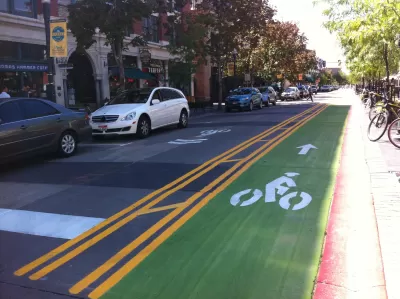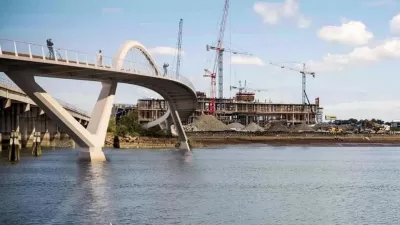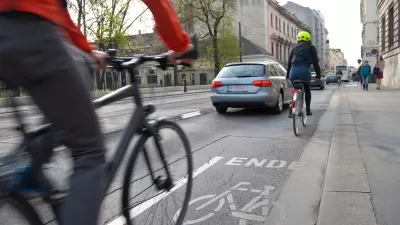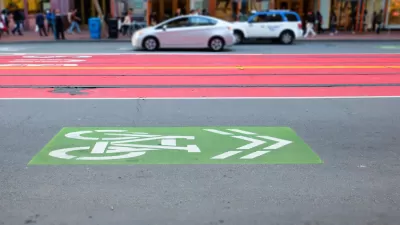A common refrain among politicians who oppose bike infrastructure investments is that people who bike don't pay for those projects. What's a bike advocate to do?

Dave Cieslewicz, of the Bike Federation of Wisconsin, explains how he responds to a fairly standard question posed to bike advocates: Why don’t cyclists want to pay for their own bike lanes?
As Cieslewicz notes, the idea to tax bike riders goes beyond idle musings. A few years ago the state of Wisconsin considered a budget amendment that "would have imposed a $25 'registration fee' on every new adult-sized bike purchase in the state." Thus, the question requires a good answer. Here, Cieslewicz provides his standard response to the line of inquiry:
…most cyclists are also drivers, so we do pay gas taxes and vehicle registration fees that go to fund roads, including bike lanes, paved shoulders and the like. When we ride state trails – and some local ones – we pay for trail passes. And then there’s the savings in wear and tear on the roads, the lessened need for expensive car parking, the reduction in pollutants and green house gas emissions and the personal health benefits that end up saving everybody money in the long run.
Cieslewicz realizes, however, that his standard inquiry can't defeat the "intellectual Teflon" of the political opposition. One idea that failed to achieve adoption was voluntary bike registration. In this post, Cieslewicz offers another idea: "expanded use of current local registration fee revenues."
FULL STORY: Tax Cyclists for Road Upgrades?

Alabama: Trump Terminates Settlements for Black Communities Harmed By Raw Sewage
Trump deemed the landmark civil rights agreement “illegal DEI and environmental justice policy.”

Planetizen Federal Action Tracker
A weekly monitor of how Trump’s orders and actions are impacting planners and planning in America.

The 120 Year Old Tiny Home Villages That Sheltered San Francisco’s Earthquake Refugees
More than a century ago, San Francisco mobilized to house thousands of residents displaced by the 1906 earthquake. Could their strategy offer a model for the present?

In Both Crashes and Crime, Public Transportation is Far Safer than Driving
Contrary to popular assumptions, public transportation has far lower crash and crime rates than automobile travel. For safer communities, improve and encourage transit travel.

Report: Zoning Reforms Should Complement Nashville’s Ambitious Transit Plan
Without reform, restrictive zoning codes will limit the impact of the city’s planned transit expansion and could exclude some of the residents who depend on transit the most.

Judge Orders Release of Frozen IRA, IIJA Funding
The decision is a victory for environmental groups who charged that freezing funds for critical infrastructure and disaster response programs caused “real and irreparable harm” to communities.
Urban Design for Planners 1: Software Tools
This six-course series explores essential urban design concepts using open source software and equips planners with the tools they need to participate fully in the urban design process.
Planning for Universal Design
Learn the tools for implementing Universal Design in planning regulations.
Clanton & Associates, Inc.
Jessamine County Fiscal Court
Institute for Housing and Urban Development Studies (IHS)
City of Grandview
Harvard GSD Executive Education
Toledo-Lucas County Plan Commissions
Salt Lake City
NYU Wagner Graduate School of Public Service





























